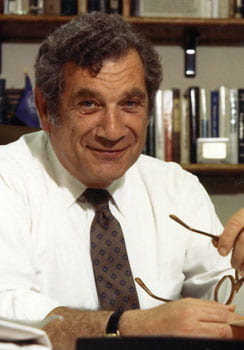Arnold R. Weber
 President
President
1984 – 1994
Born:
1930
Bronx, New York
Education: B.A., University of Illinois (1950); M.A., University of Illinois (1952); Ph.D., M.I.T. (1958)
Biography
By the mid-1980s, Northwestern’s trustees decided that controlling the school’s budget needed to be their top priority. To succeed President Robert Strotz, they chose University of Colorado President Arnold Weber, who brought with him a reputation for strong leadership and fiscal discipline.
Weber had a long history in academia prior to his election at Northwestern. His teaching career began at M.I.T., where he was an Assistant Professor of Industrial Relations from 1957-58. He was recruited by a former professor and mentor to the faculty of the Graduate School of Business at the University of Chicago, where he taught from 1958 until 1973, as the Isidore Brown and Gladys Brown Professor of Urban and Labor Economics from 1971-1973. In 1973 he moved to Carnegie Mellon University where he served as Dean of the Graduate School of Industrial Administration from 1973-1977. He then held the post of Provost and taught as a professor of economics and public policy until 1980.
Between 1980 and 1984, when he left to accept the presidency of Northwestern, Weber oversaw the University of Colorado as its President. During his time there, he cut deficits while increasing standards for admissions and academics. However, he also faced difficulty from the system’s competing schools and expressed displeasure with having to act as “a political functionary.”
Weber enjoyed great success helming Northwestern during his tenure. Though his forceful leadership style did not sit well with some members of the faculty, he effectively addressed the budget issues troubling the school’s trustees and helped to elevate the school’s growing reputation. Key to this success was his emphasis on hard and fast budgets, preventing the abuse of departments’ spending ballooning beyond their allotments. To facilitate these boundaries, he had computers installed in the finance office that could track department spending and issue alerts when budgets were near excess. Yet while reining in overspending, he nevertheless managed smaller tuition increases than years past and faculty salary increases.
To strengthen the school’s academics, Weber instituted a program review, set on a seven-year cycle. This close look at the output of many fields highlighted deficiencies to be addressed, but also revealed surprising strengths, for instance that Slavic Languages, though small, was thriving. 1986 saw “A Framework for Distinction,” which promoted strengthening interdisciplinary programs. A fundraising drive was engaged to provide new labs and research funding for the Technological Institute; in 1989, the Robert R. McCormick Tribune Foundation became a primary benefactor and the Institute was renamed the Robert R. McCormick School of Engineering and Applied Sciences in recognition. Other significant fundraising included the $35 million Campaign for Kellogg (1989), $30 million Campaign for Great Teachers (1990), $21 million Athletic Facilities Campaign (1987), and the $43.5 million Materials and Life Sciences Building (1992).
Beyond his work at universities, Weber was extensively involved in government and public administration. From 1970 to 1971 he was the Associate Director of the Office of Management and Budget. In 1971, during the wage and price freeze, he spent 90 days as Executive Director of the Cost of Living Council. He was an economic consultant to the Secretary of the Treasury from 1976 to 1979 and a member of the Economic Advisory Committee to the U.S. Secretary of Commerce from 1980 to 1982. August, 1982, also saw Weber as Chairman of the Presidential Railroad Emergency Board seeking to head off a possible train strike.
Following his retirement from the Northwestern Presidency, the next several years saw Weber remaining active on both a local and national scale. Immediately upon leaving office, his name arose in consideration for Major League Baseball Commissioner, though he officially withdrew quickly. He followed his predecessor’s footsteps becoming University Chancellor in 1995, and on June 30, 1998 was named President Emeritus, the first since Franklyn B. Snyder. During this time he also served as President of the Civil Committee of the Commercial Club of Chicago, an organization of the leaders of major Chicago corporations.
Throughout his tenure, Weber was noted for his pithy wit. Remarking on his decision to retire, he said, “I knew, when in a two-week period the basketball team beat Michigan and went to the NIT and the debate team beat Harvard for the national championship, that it was time to leave.” In his wake, Northwestern found itself stronger than ever and back on solid footing.

